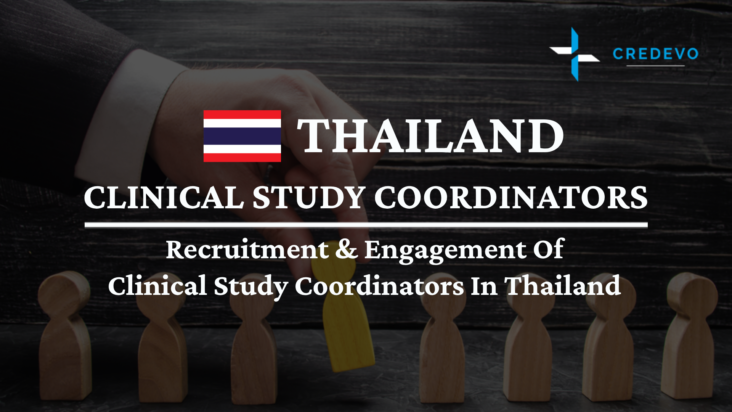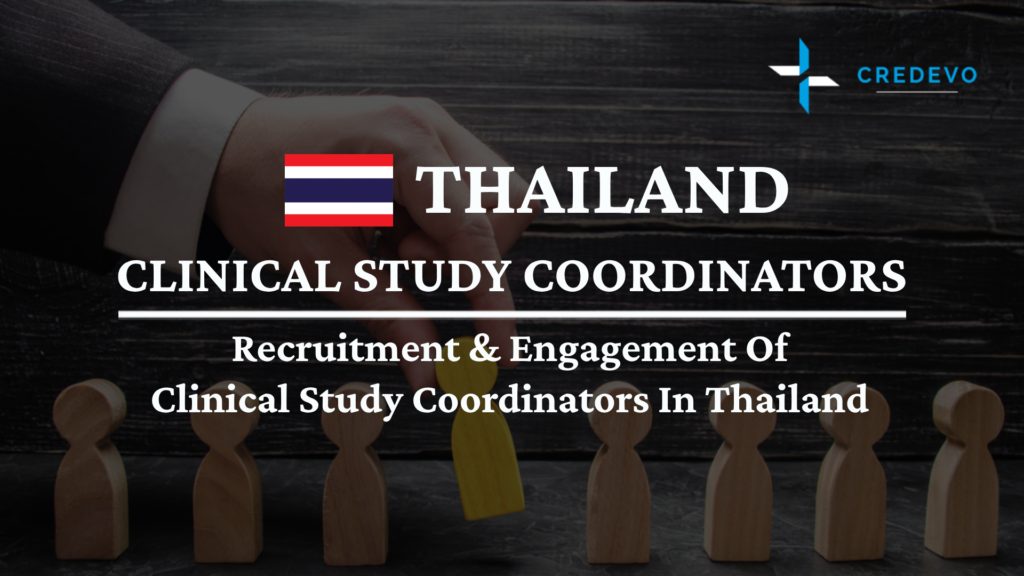Clinical Study Coordinators in Thailand: Recruitment & Engagement

Clinical trials are instrumental in advancing medical research and improving healthcare outcomes. To conduct successful clinical trials, it is crucial to recruit and engage highly skilled clinical study coordinators.

In Thailand, a country known for its thriving medical tourism industry and growing research and development sector, finding competent professionals in this field is essential.
This article serves as a comprehensive guide for recruiting, engaging, and developing clinical study coordinators in Thailand for clinical trials.
Understanding the Role of Clinical Study Coordinators (CSC)
Clinical study coordinators (CSC) play a pivotal role in managing and coordinating clinical trials. Their responsibilities encompass various critical tasks.
Tasks of clinical study coordinators in Thailand include protocol development, participant recruitment, data collection, regulatory compliance, and ethical guideline adherence.
Clinical study coordinators in Thailand act as the linchpin between research teams, healthcare institutions, regulatory bodies, and study participants, ensuring the smooth operation of clinical trials.
Why is finding clinical study coordinators (CSC) in Thailand a challenge?
Recruiting clinical study coordinators for clinical trials in Thailand can present certain challenges due to several factors:
Limited Pool of Experienced Professionals
- The field of clinical research and study coordination is still developing in Thailand. As a result, there may be a limited pool of experienced CSCs available for recruitment.
- The demand for skilled professionals often outweighs the supply, making it challenging to find candidates with the desired level of expertise.
Competition from the Medical Tourism Industry
- Thailand is renowned for its thriving medical tourism industry, attracting patients from around the world. The demand for healthcare professionals in various sectors, including clinical research, can create stiff competition for talent.
- This competition can make it difficult to attract and retain CSC who may have alternative opportunities in the medical tourism sector.
Regulatory Environment and Compliance
- Clinical trials require adherence to strict regulatory guidelines and ethical considerations. Clinical study coordinators in Thailand must have a thorough understanding of local regulations, including those by the Thai FDA, to navigate the complex regulatory landscape of clinical trials, ensuring adherence to strict guidelines and ethical considerations.
- The need for coordinators with specific regulatory knowledge and expertise adds to the challenge of finding suitable candidates.
Language Barrier
- Proficiency in both English and Thai is essential for effective communication with local stakeholders in the clinical research field in Thailand, including participants, healthcare professionals, and regulatory authorities.
- Finding CSCs who are fluent in both languages can be challenging, further narrowing the candidate pool.
Skills Gap and Training Needs
- As the field of clinical research evolves, there may be a skills gap between the requirements of clinical trials and the available talent pool.
- CSCs need to possess a combination of technical skills. These skills include data management, regulatory compliance, and knowledge of clinical trial protocols.
- Addressing the skills gap and providing ongoing training and development opportunities to enhance the expertise of coordinators can be a time-consuming and resource-intensive endeavor.
Limited Awareness and Perception
- The limited awareness and perception of the clinical study coordinator profession in Thailand despite the growth of the healthcare and research sectors make it challenging to attract qualified candidates.
- To overcome these challenges, organizations conducting clinical trials in Thailand should implement comprehensive recruitment strategies. These strategies should include proactive outreach, partnerships with educational institutions, and participation in industry events.
- Emphasizing career development opportunities and the importance of clinical research in advancing healthcare can also help attract and retain talented CSCs.
- Additionally, investing in training and mentorship programs can bridge the skills gap and enhance the capabilities of coordinators. This, in turn, contributes to the overall success of clinical trials in Thailand.
Are you searching for qualified and experienced clinical study coordinators for your trials in Thailand? Please provide your requirements below to connect with us and find the best coordinators for your clinical studies.
Qualifications and Skills to Look for
When recruiting clinical study coordinators in Thailand, consider the following qualifications and skills:
- Educational Background: Seek candidates with a degree in relevant fields such as life sciences, pharmacy, nursing, or medical technology. A background in clinical research or a related discipline is advantageous.
- Experience: Prior experience in clinical research or coordination roles is highly desirable. Candidates with knowledge of Good Clinical Practice (GCP) guidelines and familiarity with regulatory processes are particularly valuable.
- Strong Communication and Interpersonal Skills: CSCs must effectively communicate with various stakeholders, including researchers, participants, healthcare professionals, and regulatory authorities. Fluency in both English and Thai is essential.
- Attention to Detail and Organizational Skills: Clinical trials involve extensive documentation, data management, and adherence to protocols. Coordinators should be detail-oriented and possess excellent organizational skills.
- Ethical Conduct: Given the sensitive nature of clinical trials, coordinators must uphold high ethical standards and ensure participant safety and confidentiality.
- Knowledge of Regulatory Framework: Familiarity with the Thai regulatory framework for clinical trials, including the Food and Drug Administration (FDA) guidelines, is essential for ensuring compliance and successful trial execution.
- Problem-Solving Abilities: Clinical study coordinators must be capable of identifying and resolving challenges that may arise during the course of a clinical trial. They should possess strong problem-solving and critical-thinking skills.
- IT Proficiency: Proficiency in using clinical trial management systems, electronic data capture tools, and other relevant software is advantageous for efficient data management and analysis.
Click here to learn how to find quality clinical research associates and monitors in Thailand.
Engaging and Retaining Clinical Study Coordinators
Once you have recruited CSCs for your clinical trials, focus on the following approaches to engage and retain them:
- Training and Development: Provide comprehensive training programs to enhance coordinators’ skills and keep them updated with the latest industry trends, regulations, and technologies. Offering continuous learning opportunities fosters motivation and job satisfaction.
- Career Advancement: Establish clear career progression paths within your organization. Provide opportunities for coordinators to develop their expertise and take on increasing responsibilities.
- Competitive Compensation and Benefits: Offer attractive salaries and benefits packages that align with industry standards. Recognize and reward exceptional performance to foster a positive work culture and motivate coordinators.
- Supportive Work Environment: Foster a supportive and inclusive work environment that encourages open communication, teamwork, and work-life balance. Create channels for coordinators to share their ideas, concerns, and feedback.
- Collaboration and Networking: Encourage coordinators to participate in industry conferences, workshops, and seminars. This helps them expand their professional networks, exchange knowledge, and stay updated with the latest advancements in clinical research.
- Mentorship and Coaching: Implement mentorship programs to provide guidance and support to clinical study coordinators. Assign experienced mentors who can help them navigate challenges and foster their professional growth.
Conclusion
Recruiting and engaging competent CSCs is paramount for the success of clinical trials in Thailand. By understanding the critical role, qualifications, and skills required, and implementing effective recruitment strategies, organizations can attract top talent.
Additionally, focusing on engagement and career development initiatives helps retain CSCs and create a motivated workforce.
A skilled and dedicated clinical study coordination team ensures seamless trial execution and advances medical research and healthcare outcomes in Thailand and beyond.
Is your organization in need of Clinical Study Coordinators for your clinical trials?
Do you have any questions or are you searching for qualified and experienced CSCs for your trials in Thailand? Please provide your requirements below to connect with us and find the coordinators for your clinical studies.